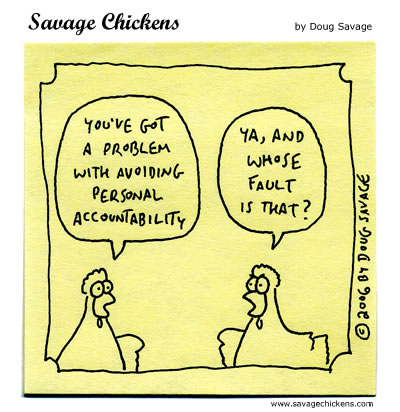 “The search for someone to blame is always successful.” – Robert Half
“The search for someone to blame is always successful.” – Robert Half
“When you blame others, you give up your power to change.” –Dr. Robert Anthony
“Yes, there are times when something is legitimately not our fault. Blaming others, however, keeps us in a stuck state and is ultimately rough on our own self-esteem.” – Eric Allenbach
1. to hold responsible; find fault with; censure:
2. to place the responsibility for (a fault, error, etc.) (usually followed by on ): I blame the accident on her.
As exemplified from the definition and the quotes above, blame is the act of holding someone else or something else responsible. Every time we blame, we avoid personal responsibility. When we blame a circumstance or other people for our failings or our current state of dissatisfaction, we hinder out ability to move forward. It is very difficult to learn from the results of our thoughts, feelings, actions and beliefs if we continually blame “God”, “Nature”, or “Them” for our current reality.
Robert Half was correct when he said, “the search for someone to blame is always successful”. It is easy to blame others. When we do we no longer feel the possible emotional discomfort associated with owning our mistakes. If our boss is angry about the result of a current project, it feels safer to blame a co-worker. In the workplace, blame can be harmful since it can facilitate a cycle of blame – defensiveness- attack –blame cycle.
Just think how easily blame can creep into our own lives. If we are late for work, it is customary to blame the traffic or other life circumstances. How many times have you been at work when a co-worker arrived and stated; “I apologize for being late. I did not adequately plan my time so I am responsible for my tardiness. Could you please write me up so I am discouraged from continuing my pattern of poor time management?”
When we blame, we have a negative influence on others. If we model the pattern of blaming at home, our children will imitate our pattern of avoiding accountability. When we blame our spouse/partner for our own emotional responses, our spouse/partner will likely feel resentful.
Blame is a habit that we are in control of. Once we become aware of our tendencies to blame, we can move away from blame and move towards personal responsibility.
Personal responsibility arises from acknowledgement that we are in control of our beliefs, habits, thoughts, feelings, responses, words and actions. When we accept personal responsibility, we understand that we are responsible for our general life circumstances. If we are dissatisfied with how things are, personal responsibility will lead us to changing our situation whereas blame will allow us to be complacent and stick with the status quo of dissatisfaction.
I accept full responsibility for this post!



